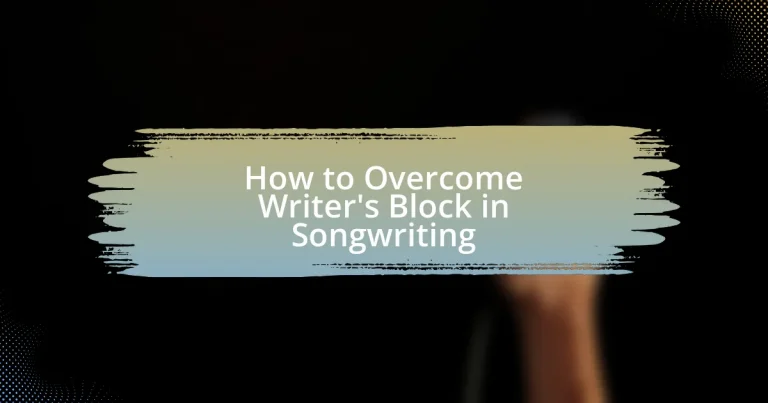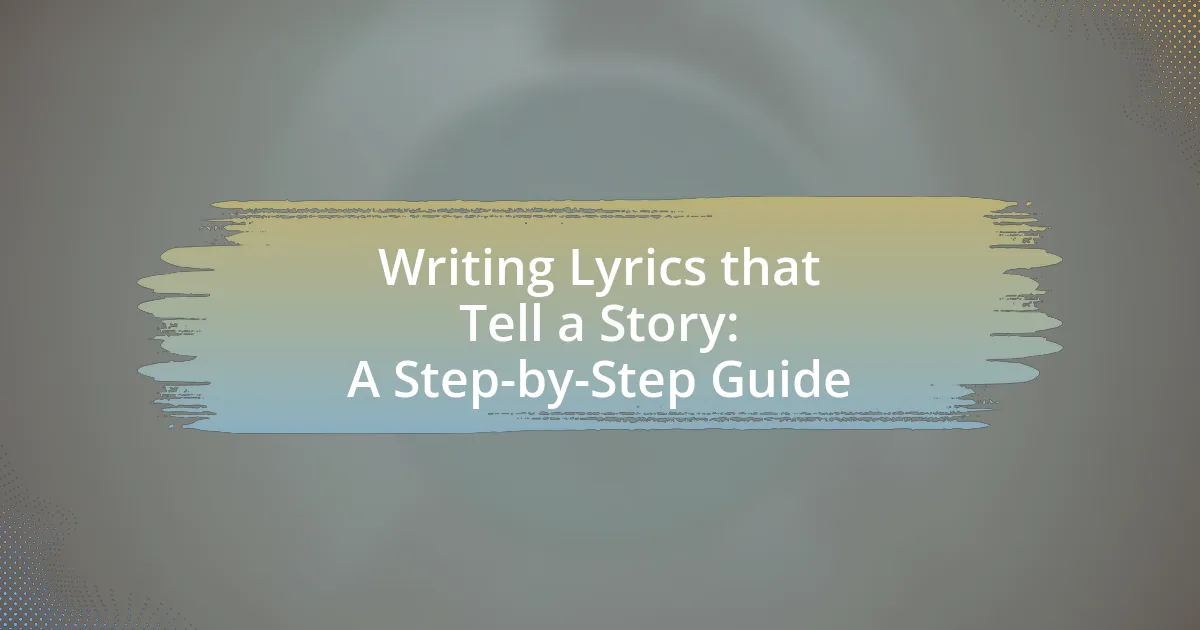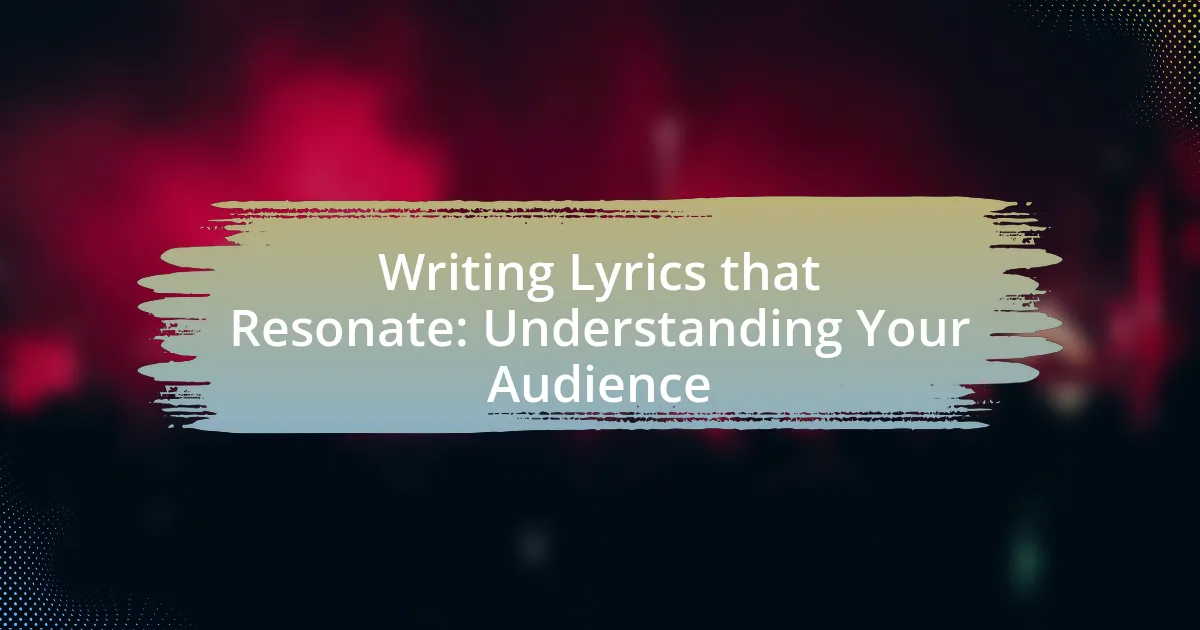Writer’s block in songwriting is a common creative barrier that affects approximately 70% of songwriters, hindering their ability to generate new ideas or complete songs. This article explores the manifestations, psychological factors, and external pressures contributing to writer’s block, as well as its impact on creativity and productivity. It also identifies various types of writer’s block, such as creative and perfectionism blocks, and offers practical strategies for overcoming these challenges, including establishing routines, changing environments, and collaborating with others. Additionally, the article discusses techniques like free writing and mindfulness practices that can help manage anxiety and stimulate creativity, ultimately providing actionable tips for preventing and addressing writer’s block in songwriting.
What is Writer’s Block in Songwriting?
Writer’s block in songwriting is a creative barrier that prevents songwriters from generating new ideas or completing their work. This phenomenon can occur due to various factors, including stress, self-doubt, or lack of inspiration, which hinder the flow of creativity. Research indicates that approximately 70% of songwriters experience writer’s block at some point in their careers, highlighting its prevalence in the industry.
How does Writer’s Block manifest in songwriters?
Writer’s block in songwriters manifests as an inability to generate new ideas or complete songs, often leading to frustration and self-doubt. This condition can result in a lack of inspiration, difficulty in finding the right words or melodies, and an overwhelming sense of pressure to produce work, which can further inhibit creativity. Research indicates that approximately 70% of songwriters experience writer’s block at some point, highlighting its prevalence in the creative process.
What are the common signs of Writer’s Block?
Common signs of Writer’s Block include an inability to produce new work, persistent self-doubt about writing quality, and a lack of inspiration or ideas. Writers may also experience frustration or anxiety when attempting to write, leading to avoidance behaviors such as procrastination. These signs indicate a mental barrier that hinders creativity and productivity, often resulting in a feeling of being stuck or overwhelmed.
How does Writer’s Block affect creativity and productivity?
Writer’s Block significantly hinders creativity and productivity by creating mental barriers that prevent individuals from generating ideas and completing tasks. This condition can lead to frustration and anxiety, which further diminishes creative output. Research indicates that approximately 70% of writers experience Writer’s Block at some point, impacting their ability to produce work consistently. The inability to write can result in decreased motivation and a loss of confidence in one’s creative abilities, ultimately stalling projects and reducing overall productivity.
Why do songwriters experience Writer’s Block?
Songwriters experience Writer’s Block primarily due to psychological factors such as fear of failure, perfectionism, and self-doubt. These mental barriers can inhibit creativity and lead to a lack of inspiration, making it difficult for songwriters to produce new material. Research indicates that high levels of anxiety and pressure to create can further exacerbate these feelings, resulting in a mental block that prevents the flow of ideas. For instance, a study published in the Journal of Creative Behavior found that emotional states significantly influence creative output, highlighting the connection between mental well-being and artistic productivity.
What psychological factors contribute to Writer’s Block?
Psychological factors contributing to Writer’s Block include fear of failure, perfectionism, and self-doubt. Fear of failure can paralyze writers, making them hesitant to produce work due to anxiety about negative evaluation. Perfectionism leads to unrealistic standards, causing writers to feel that their output is never good enough, which can halt creativity. Self-doubt undermines confidence, making writers question their abilities and ideas, further exacerbating the block. Research by Flett and Hewitt (2002) indicates that perfectionism is significantly linked to increased anxiety and avoidance behaviors in creative tasks, reinforcing the impact of these psychological factors on Writer’s Block.
How do external pressures influence Writer’s Block?
External pressures significantly contribute to Writer’s Block by creating stress and anxiety that hinder creative expression. Factors such as deadlines, expectations from peers or audiences, and financial concerns can overwhelm writers, leading to a mental block. Research indicates that high levels of stress can impair cognitive functions, making it difficult for individuals to generate ideas or articulate thoughts effectively. For instance, a study published in the Journal of Creative Behavior found that external stressors negatively impact creative problem-solving abilities, which are crucial for songwriting. Thus, the influence of external pressures on Writer’s Block is both psychological and cognitive, affecting a writer’s ability to produce work.
What are the different types of Writer’s Block?
There are several types of Writer’s Block, including creative block, perfectionism block, and fear of failure block. Creative block occurs when a writer struggles to generate new ideas or inspiration, often feeling mentally exhausted or uninspired. Perfectionism block arises when a writer is overly critical of their work, leading to hesitation in producing content due to the desire for it to be flawless. Fear of failure block is characterized by anxiety about the reception of one’s work, which can paralyze the writing process. Each type of Writer’s Block can significantly hinder the songwriting process, making it essential for songwriters to identify and address these specific challenges.
How does emotional Writer’s Block differ from creative Writer’s Block?
Emotional Writer’s Block differs from creative Writer’s Block in that it is primarily rooted in personal feelings and psychological states, while creative Writer’s Block is linked to a lack of inspiration or ideas. Emotional Writer’s Block often arises from stress, anxiety, or unresolved emotional issues, which inhibit the writer’s ability to express themselves. In contrast, creative Writer’s Block can occur even when a writer is emotionally stable but struggles to generate new concepts or find the right words. Research indicates that emotional factors can significantly impact creativity, as seen in studies that show heightened emotional distress correlates with decreased creative output.
What role does perfectionism play in Writer’s Block?
Perfectionism significantly contributes to Writer’s Block by creating unrealistic standards that hinder creativity and productivity. Writers often become paralyzed by the fear of not meeting their own high expectations, leading to avoidance of the writing process altogether. Research indicates that perfectionism is linked to increased anxiety and self-doubt, which can exacerbate Writer’s Block. A study published in the Journal of Personality and Social Psychology found that individuals with high perfectionistic tendencies experience greater difficulty in initiating and completing tasks, including writing. This cycle of perfectionism and Writer’s Block can be detrimental to a writer’s ability to express themselves and produce work.
What strategies can help overcome Writer’s Block in Songwriting?
To overcome Writer’s Block in songwriting, one effective strategy is to establish a routine that includes dedicated time for writing, which can help create a habit and reduce pressure. Research indicates that consistent practice enhances creativity and productivity, as seen in studies by psychologist Mihaly Csikszentmihalyi, who found that engaging in regular creative activities leads to improved flow and idea generation. Another strategy is to change the environment, as a new setting can stimulate inspiration and fresh ideas. Additionally, collaborating with other songwriters can provide new perspectives and ideas, making the process more dynamic and less isolating. These strategies collectively address the common challenges of Writer’s Block by fostering creativity and encouraging a proactive approach to songwriting.
How can songwriters change their environment to combat Writer’s Block?
Songwriters can change their environment by altering their physical space, which can stimulate creativity and reduce Writer’s Block. For instance, moving to a different room, going outside, or rearranging their workspace can provide new perspectives and inspiration. Research indicates that environmental changes can enhance cognitive flexibility, which is crucial for creative processes. A study published in the Journal of Environmental Psychology found that exposure to natural environments can significantly improve creative thinking. Therefore, by intentionally modifying their surroundings, songwriters can effectively combat Writer’s Block.
What specific changes in the workspace can enhance creativity?
Specific changes in the workspace that can enhance creativity include incorporating natural light, flexible seating arrangements, and creative decor. Natural light has been shown to improve mood and cognitive function, which can lead to increased creativity. Flexible seating arrangements allow individuals to choose their preferred working position, fostering comfort and inspiration. Creative decor, such as artwork or plants, can stimulate the mind and encourage innovative thinking. Studies indicate that environments rich in visual stimuli can enhance creative problem-solving abilities, making these changes effective in overcoming writer’s block in songwriting.
How does collaborating with others help in overcoming Writer’s Block?
Collaborating with others helps in overcoming Writer’s Block by providing fresh perspectives and ideas that can stimulate creativity. When songwriters work together, they can share their thoughts, brainstorm concepts, and inspire each other, which often leads to breakthroughs in the creative process. Research indicates that collaboration can enhance problem-solving abilities and increase motivation, as seen in a study published in the Journal of Creative Behavior, where participants reported higher levels of creativity when working in groups compared to working alone. This dynamic interaction not only alleviates feelings of isolation but also fosters a supportive environment that encourages risk-taking and experimentation, essential elements for overcoming creative barriers.
What techniques can be used to stimulate creativity?
Techniques to stimulate creativity include brainstorming, free writing, and engaging in diverse experiences. Brainstorming allows individuals to generate a large number of ideas without judgment, fostering an open environment for creativity. Free writing encourages writers to express thoughts without concern for structure or grammar, which can lead to unexpected insights. Engaging in diverse experiences, such as exploring new environments or learning new skills, can provide fresh perspectives and inspiration. Research by the American Psychological Association indicates that exposure to varied stimuli enhances creative problem-solving abilities, supporting the effectiveness of these techniques in overcoming writer’s block in songwriting.
How can free writing or journaling assist in breaking through Writer’s Block?
Free writing or journaling can effectively assist in breaking through Writer’s Block by allowing writers to express thoughts without the constraints of structure or judgment. This unfiltered writing process encourages creativity and helps to bypass mental barriers, enabling the flow of ideas. Research indicates that free writing can reduce anxiety associated with performance pressure, as it shifts focus from producing polished work to simply generating content. A study published in the Journal of Creative Behavior found that engaging in free writing exercises significantly improved participants’ creative output and reduced instances of Writer’s Block.
What role does music theory play in overcoming creative obstacles?
Music theory plays a crucial role in overcoming creative obstacles by providing a structured framework that guides songwriters in their creative process. This framework helps artists understand the relationships between notes, chords, and rhythms, enabling them to explore new musical ideas without feeling lost. For instance, knowledge of chord progressions can inspire variations and new melodies, while an understanding of scales can lead to innovative improvisation. Research indicates that musicians who apply music theory concepts are more likely to generate original compositions, as they can systematically manipulate musical elements to express their ideas effectively.
How can songwriters manage their mindset to overcome Writer’s Block?
Songwriters can manage their mindset to overcome Writer’s Block by implementing structured routines and practicing mindfulness techniques. Establishing a consistent writing schedule helps create a habit, making it easier to engage with the creative process. Mindfulness practices, such as meditation or deep breathing, can reduce anxiety and promote a more relaxed state of mind, allowing for greater creative flow. Research indicates that mindfulness can enhance creativity by fostering a non-judgmental awareness of thoughts, which can lead to new ideas and perspectives.
What mindfulness practices can help reduce anxiety related to songwriting?
Mindfulness practices such as deep breathing, meditation, and body scanning can significantly reduce anxiety related to songwriting. Deep breathing exercises help calm the nervous system, allowing songwriters to focus better on their creative process. Meditation, particularly mindfulness meditation, encourages present-moment awareness, which can alleviate worries about performance or judgment. Body scanning, a technique that involves paying attention to physical sensations, can help songwriters release tension and become more attuned to their emotions, fostering a more open and creative mindset. Research indicates that mindfulness practices can lower anxiety levels and improve overall well-being, making them effective tools for overcoming writer’s block in songwriting.
How does setting realistic goals aid in overcoming Writer’s Block?
Setting realistic goals aids in overcoming Writer’s Block by providing clear, achievable targets that reduce anxiety and enhance motivation. When writers establish specific, manageable objectives, they create a structured approach to their work, which can alleviate the overwhelming feelings often associated with Writer’s Block. Research indicates that breaking down larger tasks into smaller, attainable goals can lead to increased productivity and a greater sense of accomplishment, as evidenced by studies in behavioral psychology that show goal-setting improves focus and reduces procrastination.
What are some practical tips for preventing Writer’s Block in Songwriting?
To prevent Writer’s Block in songwriting, establish a consistent writing routine. Regularly dedicating time to write, even without specific goals, helps maintain creativity and reduces pressure. Additionally, experimenting with different songwriting techniques, such as free writing or using prompts, can stimulate ideas and keep the creative flow active. Engaging in activities outside of songwriting, like listening to diverse music genres or collaborating with other artists, can also inspire new perspectives and ideas. Research indicates that creative routines and varied stimuli significantly enhance creative output, supporting the effectiveness of these strategies.
How can establishing a routine help maintain creativity?
Establishing a routine can help maintain creativity by providing a structured environment that fosters consistent creative output. Routines create a sense of discipline, allowing individuals to dedicate specific time slots for creative activities, which can lead to increased productivity and reduced procrastination. Research indicates that habitual practices can enhance cognitive function and creativity; for instance, a study published in the journal “Psychological Science” found that regular engagement in creative tasks can lead to improved problem-solving skills and innovative thinking. By integrating routine into the creative process, individuals can cultivate an atmosphere conducive to inspiration and idea generation.
What daily habits can support consistent songwriting practice?
Daily habits that can support consistent songwriting practice include setting aside dedicated time for writing, maintaining a songwriting journal, and engaging in regular listening to diverse music genres. Establishing a specific time each day for songwriting creates a routine that fosters creativity and discipline. Keeping a songwriting journal allows for the documentation of ideas, lyrics, and melodies, which can be revisited and refined over time. Additionally, listening to various music styles can inspire new ideas and techniques, enhancing the songwriter’s versatility. Research indicates that routine practice significantly improves creative output, as seen in studies on habit formation and creativity.
How does regular exposure to new music influence songwriting flow?
Regular exposure to new music enhances songwriting flow by broadening a songwriter’s creative palette and inspiring fresh ideas. This exposure introduces diverse musical structures, lyrical themes, and stylistic elements, which can stimulate innovative thinking and help break through creative barriers. Research indicates that listening to a variety of genres can activate different cognitive processes, fostering a more dynamic approach to songwriting. For instance, a study published in the Journal of Creative Behavior found that musicians who regularly engage with new music report increased creativity and improved problem-solving skills in their artistic endeavors.
What resources can songwriters utilize to stay inspired?
Songwriters can utilize various resources to stay inspired, including music libraries, songwriting workshops, and collaboration with other artists. Music libraries provide a vast array of sounds and styles that can spark creativity, while songwriting workshops offer structured environments for learning and sharing ideas. Collaborating with other artists introduces new perspectives and techniques, enhancing the songwriting process. Research indicates that collaboration can lead to increased creativity and innovation in artistic endeavors, as seen in studies published in the Journal of Creative Behavior.
How can songwriting workshops and communities provide support?
Songwriting workshops and communities provide support by fostering collaboration, offering constructive feedback, and creating a safe space for sharing ideas. These environments encourage songwriters to connect with peers, which can lead to the exchange of techniques and inspiration that help overcome creative blocks. Research indicates that collaborative efforts in creative fields significantly enhance productivity and innovation, as seen in studies by the University of California, which found that group brainstorming sessions can lead to a 20% increase in idea generation. Additionally, the supportive atmosphere of workshops reduces the fear of judgment, allowing songwriters to experiment and take risks, further aiding in the resolution of writer’s block.
What role do books and online courses play in enhancing songwriting skills?
Books and online courses play a crucial role in enhancing songwriting skills by providing structured knowledge, techniques, and inspiration. They offer insights into songwriting theory, lyric writing, and composition strategies, which can help songwriters develop their craft. For instance, books like “Writing Better Lyrics” by Pat Pattison provide practical exercises and examples that can stimulate creativity and overcome writer’s block. Online courses, such as those offered by platforms like Coursera or MasterClass, allow songwriters to learn from industry professionals, gaining access to valuable feedback and community support. This combination of theoretical knowledge and practical application fosters skill development and encourages experimentation, ultimately leading to improved songwriting abilities.
What are the best practices for dealing with Writer’s Block when it occurs?
To effectively deal with Writer’s Block, songwriters should implement structured practices such as setting a routine, free writing, and changing their environment. Establishing a consistent writing schedule helps create a habit, making it easier to produce content regularly. Free writing, which involves writing continuously without worrying about grammar or structure, can stimulate creativity and generate new ideas. Additionally, altering the writing environment, such as moving to a different location or rearranging the workspace, can provide fresh perspectives and inspire creativity. These methods are supported by research indicating that routine and environmental changes can enhance cognitive flexibility, which is crucial for overcoming creative blocks.
How can songwriters effectively take breaks without losing momentum?
Songwriters can effectively take breaks without losing momentum by implementing structured short breaks and engaging in related creative activities. Research indicates that brief, intentional pauses can enhance creativity and prevent burnout, allowing songwriters to return to their work with fresh perspectives. For instance, a study published in the journal “Psychological Science” found that taking breaks can lead to improved problem-solving and idea generation. By using techniques such as the Pomodoro Technique, where writers work for 25 minutes followed by a 5-minute break, songwriters can maintain their flow while allowing their minds to rest. Additionally, engaging in activities like listening to music, journaling, or brainstorming can keep the creative juices flowing during breaks, ensuring that momentum is preserved.
What strategies can be employed to return to a stalled song project?
To return to a stalled song project, one effective strategy is to change the creative environment. Altering the surroundings can stimulate new ideas and perspectives, which is crucial for overcoming writer’s block. Research indicates that a change in scenery can enhance creativity by providing fresh stimuli and reducing mental fatigue associated with a stagnant workspace. Another strategy is to revisit and analyze completed songs for inspiration; this can reignite motivation and clarify the direction of the stalled project. Additionally, setting specific, achievable goals can help break the project into manageable tasks, making it easier to progress. Engaging in collaborative sessions with other musicians can also provide new insights and ideas, fostering a more dynamic creative process.





